Get posts by email
Transition to Scholar with Project-Based Learning ~ Hello High School
September 27, 2013
Last winter, Céline's education took a turn. She expressed her desire to steer her own ship and with some trepidation I agreed.
"But Renee," you may ask. "I thought you were interest-led learners, don't you want your kids to steer their own ship?"
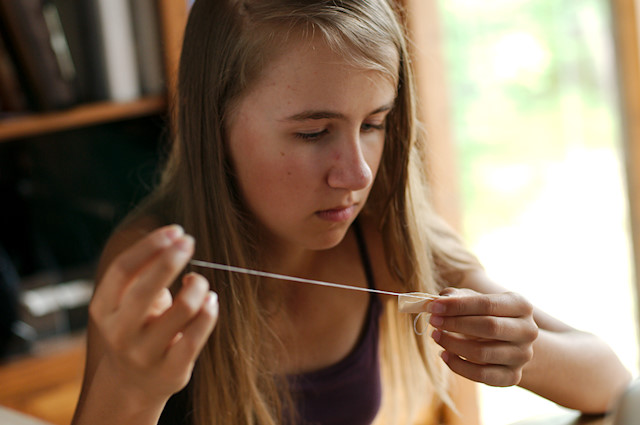
Absolutely. But when your child steers her ship in a direction you had never conceived it does test your resolve.
Last winter Céline told us she wanted to simplify her studies around one main theme - Role Playing Games (RPGs). Having spread the table with many ideas and options the previous fall, this was what fascinated and captivated her the most. Something not even a part of my carefully constructed curriculum.
Looking back I'm not sure why I was so surprised. In her previous fall assessment I recorded this interest of hers. And my specific aim for the coming school year was to "use this interest" to inspire the growth of some skills and aptitudes that needed development, e.g., writing.
The development of Céline's writing skills did come about by the way, in a most unexpected and delightful way, as related to her interest in RPGs.
Céline met a group of teens online who share her love for role playing games. As a group, they create characters and write stories together. Céline now engages in this peer-supported creative writing on a regular basis. Writing ~ Check.
As an interest-led homeschooling parent my objective is that our young adult children will take responsibility for their education in their scholar years. It's what we've been working towards all these years.
How do we do work towards this aim? By giving our young children lots of freedom to play and discover the passions and interests that will light their fire and ultimately motivate them to work hard.

We fan the flame within instead of lighting a fire beneath.
But I was definitely a bit hung-up on a preconceived notion of what scholar stage pursuits might look like. Céline has studied many interests over the years that would fit such a description, something easily labelled as "scholarly".
Those subjects and ideas were easy for me to fit into a scholar mold. "Games" were not. I lacked the imagination to see the potential. But only for short, short while.
I am sold on interest-led learning. On learners having freedom and responsibility, and I wasn't going to let my little hang-ups about what counted as studies and what didn't get in the way of my daughter's passions.
So last winter and spring, Damien and I dived in and partnered with Céline to guide this study.
The best way Damien and I could conceive of guiding our daughter in an RPG based curriculum was with a project. A project arising from her interests and her vision. This was not a parent assignment. This was complete learner-directed project work.
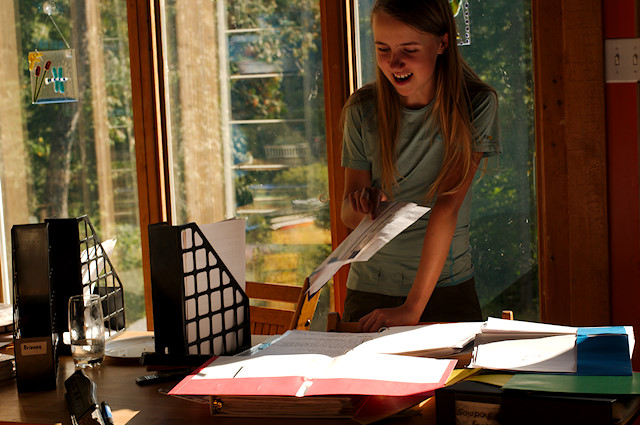
Project-Based learning
In the early years of homeschooling I loved the ideas of unit studies. This was a method of learning that appeared to bring together separate subjects into a whole. And I wanted to encourage this in our homeschool.
In reality, in our home at least, unit studies were simply a lot of work for me (even when you followed a pre-made study) and were problematic when the learner's interest tracked somewhere else.
Our children have always engaged in project-based learning. I just didn't have the language for it until about four years ago, when Céline hit her middle years.
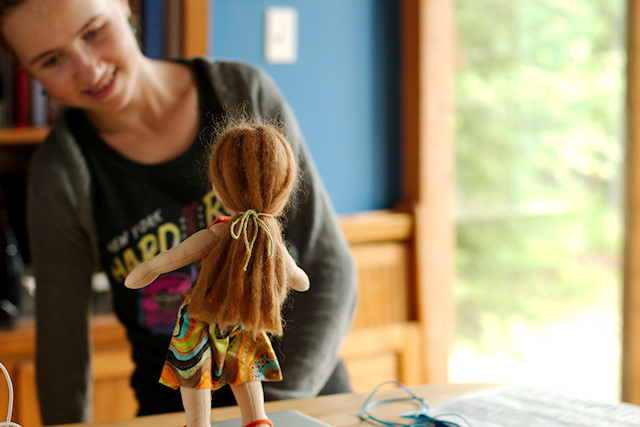
We were still figuring out our way with project-based learning back then. We experimented a bit with parent-directed projects, which we found to be ineffective in achieving our objective. Which was to have our student own her learning and move forward on her own initiative.
What does project-based learning look like in our house?
When our kids were young it looked like intense play, that arose from interests or obsessions. Projects in those days were as "simple" as building a lego house, or completing a drawing. We didn't have the language then to call it "projects" it was simply play, crafts, activities, etc.
Most of my children's early self-directed projects were crafts involving lots of paper towel tubes and masking tape. And when they were exposed to Rube Goldberg machines, well then there were domino and marble contraptions set up all over the living room.
There was a long period of time where making miniatures, along with dollhouses and castles, was an on-going project. The kids did a huge amount of research, reading, and problem solving in making those toys.

There was the pond Laurent built in our backyard and girls' gardens. And always many sewing projects.
I remember a couple years ago when the kids published a newspaper over the course of a few weeks. I still have it, of course. Articles were written with a featured story on the (fictional) feral cat population of Lunenburg county. Ads were created for products. A title was chosen, etc. It was published and read by the household to much acclaim and fanfare.
I've just pulled a few small examples from the recesses of my memory. If I looked through our portfolios I could name project after project our students' have accomplished.
I believe children will engage in project-learning, without needing a lot of direction from adults, if they are allowed and encouraged to do this.
Projects are a normal life occurrence in most every home - renovating the bathroom, planning and taking a trip, organizing a Christmas party - these are projects. People do them all the time.

However, even though kids can conceive and follow-through projects on their own, support from parents is crucial. Support is:
- Giving children time for their projects.
- Giving them space in the home. (We've never had separate project or studio space, we simply allow our children to live in our living room.)
- Observing their interests and providing project suggestions.
- Gathering resources and materials beyond your children's means. We want to encourage our children to be resourceful but they will be limited by what they are exposed to. So expose them to good stuff and have the supplies they need for open-ended discovery.
- Finding mentors when the projects go beyond your knowledge and expertise.
- and more...
Project-based learning happens all the time in our home. I have projects, Damien has projects, each of our kids is always working on a project, or two.
Projects, as a homeschool method, became more front and center in our homeschool when Damien started working at home and was therefore more active in homeschool life.
Coming as he did, from the real working world (vs. the homeschool world of curriculum fairs), project-based learning makes total sense to Damien.
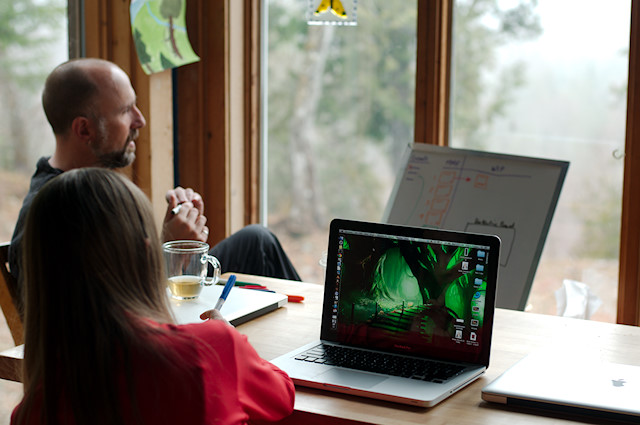
Work in the real world is largely project-based. It is not "school subject" based. You don't do geography projects in the real world. You take a road trip. You don't do English projects. You start a blog. You don't do science projects. You plant a garden. You don't do math projects. You renovate the bathroom.
And so, when Damien became more involved in our homeschool, bringing his "real world working experience" with him, projects became a cornerstone piece of the homeschool puzzle.
Project-based learning for our scholar
Whereas our younger students move in and out of projects, depending on the day and their whims (the privilege of childhood), Céline is engaged in project-based learning on a near daily basis (the responsibility of young adulthood). A responsibility she is ready and willing to accept. Laurent is surprisingly close to this reality also.
Our role as parents in this process is to provide: structure, guidance, accountability, resources, collaboration and connections.
We help our daughter structure her day to meet her goals. We do this by structuring our home life to support her learning and everyone's learning.
We provide guidance and accountability with regular meetings where we check in on her progress and briefly record what's been going on. (The project itself is the evidence of the learning. I like to keep notes along the way, because that's just what I do. I'm the meeting secretary, you could say.)
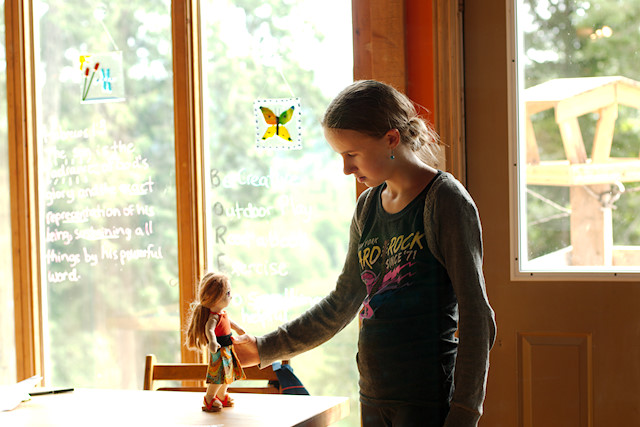
We provide resources beyond our daughter's means but not too much. She needs to learn how to find and secure resources.
We collaborate with our daughter in overcoming obstacles and barriers. Our meetings are mostly to answer the questions: Where are you stuck? And, how can we help?
We help our daughter make the connections she needs to move forward; finding mentors, lessons, classes, etc. to meet her needs.
Céline's last winter and spring school term was as much about figuring out how to manage independent project-based learning, as it was the project itself (which is still ongoing).

This is not school-at-home. And I have very few in-real-life models to look to. None of my old homeschool mentors from back when I actually knew local homeschoolers, homeschooled this way. Or if they did, it wasn't evident to me at the time.
High school was the stage when homeschoolers took classes at the local high school, completed at-home courses that looked very "schooly" and could easily be quantified as history, writing, math, science, or enrolled in high school completely.
Lori Pickert's book Project-Based Homeschooling and blog has been a helpful place to glean ideas and find encouragement for this learning method. I highly recommend it. But even with books at hand, we still have to find our own way. Figuring out processes and systems that will be unique to our family.
Project-based learning as one piece of the whole picture
A funny thing happened when we let our daughter dive head-long into a project which, on the surface, seems rather non-academic. Role playing games?
Two interesting things happened actually.
First, the academic subjects (those things that post-secondary institutions and nosey neighbors want to know you've studied) like history, foreign language, mathematics, and design started to show themselves through this project. Along with study skills such as research, time management, note taking, organizing information, project development, collaboration, etc.

The second interesting outcome took a bit longer to develop, as these things do. We gave our daughter all the time she wanted to pursue this project. We didn't say "this project" and .... We gave her total freedom for just the project and we muddled our way through supporting that endeavor.
During that time our daughter did a lot of online reading, a lot of drawing, a lot of "playing around" with computer graphic applications.
She took a break over summer and when our school routine started again - a regular daily schedule for learning - things exploded. There are simply not enough hours in the day for Céline to study and learn all the things she wants to do. What a wonderful way to live!
The project opened up a doorway for Céline to Japanese culture, and she's officially become a Japanophile. She wants to learn Japanese, the language (currently studying Hirgana).

She found an online course, she practices every day, she is starting, just starting, to sound out Japanese character words in her favorite Manga.
Céline is in the "fascinated by dystopian worlds phase" of young adulthood. "Mom, have you heard of the book "Nineteen Eighty-Four"?" She's finding books, ordering them, reading.
She's sewing every spare minute she has, making dolls of course. This latest one with a Japanese girl school uniform. She's drawing Manga-inspired characters for the gaming she does with her friends online. Beautiful drawings, she's so pleased with herself.
She joins her brother and sister for grammar, loves to be quizzed especially, anxious to prove she knows this stuff (which I've never taught her).
Céline is working to finish pre-algebra. The last math we require our students to study. Higher math will be her call entirely.
In the evenings, we all watch Canada: A People's History together. The four of us together again in our studies. And I hear her chuckling from her study corner, while I read stories to her brother and sister. You can't help being drawn into a good story.

The project is there. It simmers in her mind and she works on it regularly. We meet, we discuss, and she does the work she wants to do to move it forward.
And when she's not working on the project she is taking Japanese lessons, writing stories online, creating characters for those stories, sewing, cooking supper once a week, taking Taekwondo lessons, reading books, watching sci-fi movies with her Dad, reading online, going for walks with her family, talking about starting a blog, running on the weekends, learning some more programming from her Dad, and mixing the music on Spotify.
Hello high school.
My scholar. My teenager. Could learning be more lovely than this?
Our home is filled with young adult vigor (the late nights!), enthusiasm, concentrated study, knowledge bursting-at-the-seams, determination, and lots of good humor (and loud rock music whenever I agree to it).
And I am in love, all over again. In love with my beautiful daughter, coming into her own. In love with homeschooling. In love with interest-led learning. In love with our home life that supports our children in their growth. In love with my husband who supports this endeavor right by my side. In love with my life.
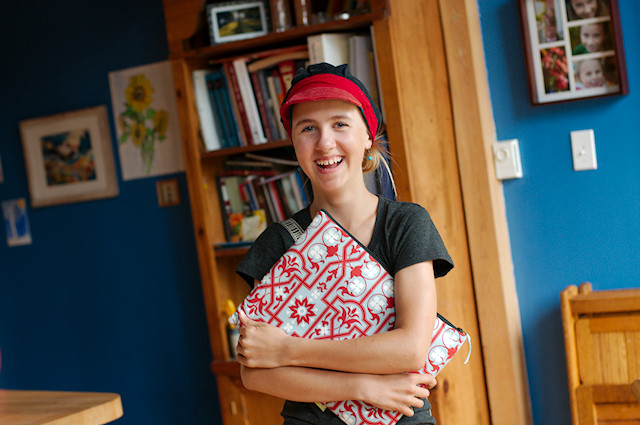
This is what interest-led learning looks like. It looks like love.
Yes, I am a sappy sentimentalist (grounded in the reality of the experience) when it comes to interest-led learning. It's beautiful and I will continue to share that beauty and joy, with my whole heart.
I'd like to share my thoughts about what Céline's high school years might look like and how (or if?) that will translate to post-secondary preparation and studies. But that's obviously another post or two in the making.
This post published with permission and editorial feedback and corrections from Céline.
Project-Based Learning and Interview Assessments is a follow-up to this post.
Filed Under
Resource Library
-

Sarah m on Sept. 27, 2013, 2:28 p.m.
I feel like I should stand up and start the wave or something!
What a great post, thanks for letting us peek into this transition, Celine (and Renee). :)
These topics give so much encouragement that we CAN do this, without seeing the end over the hil; that our kids will blossom, as yours certainly is.
Sarah M
-

JenP on Sept. 27, 2013, 3:02 p.m.
This is a wonderful post and just what I needed to hear! No, I don't have a high schooler. My oldest is not quite 8. He always comes up with the greatest projects for himself and I'm thinking, "Yes! This is interest-led learning!" But I get frustrated when he loses interest and can't seem to finish ANY of the projects he starts. Your post gives me hope that as gets older and more mature the finishing will become more important to him. And it helps me to recognize that he learns from unfinished projects too.
-

renee on Sept. 27, 2013, 3:42 p.m.
Just give it time (and always lots of encouragement), even unfinished projects are interest-led learning. Do you follow through on everything you start or conceive? I don't! And with good cause too. Life is too short. Other things need to be done and captivate our hearts and minds.
I am just as guilty of this, but I think we expect too much too soon sometimes with interest-led learning (or other school-at-home alternatives) because we want to show ourselves and others that it works, "look, my 7yr old just completed a model of DNA" (or whatever). When we really tune into what our kids are accomplishing in the course of month or months, spreading a feast for them of things we love and enjoy doing, and simply enjoying being together - we'll notice so much learning going on. In addition to any lessons we may be intentionally teaching them. Because it is happening, all the time. (smile). Even letting go of projects and saying "I'm not interested in this anymore", that's learning too. An important skill actually of letting go and moving onto new things.
(just a few thoughts...)
-

JenP on Sept. 27, 2013, 5:57 p.m.
Thanks for your response. And no, I certainly don't finish everything I start! I never thought about it that way. Your post really reassured me that I'm on the right track, and I just need to keep giving him time, freedom and encouragement. Thank you, Renee, for putting your thoughts and experiences "out there" for all of us. You've inspired me for years. In fact when I started reading your blog, I was not a homeschooler, now I happily am. Also, incidentally, I am now plant-based too! Perhaps soon I will move to Canada or hike the AT! :)
-
-
-

Leslie on Sept. 27, 2013, 5:59 p.m.
What a lovely post! I also really liked your previous one. Interest-led learning is so inspiring, and we're starting to implement it at home with our 7 and 5 year old. Obsession abounds, and hopefully their natural curiousity will lead them to some fun projects. Thanks for sharing your story.
-

jacinda on Sept. 27, 2013, 10:23 p.m.
Yes, I'm part of the wave. What a beautiful post...lots of details about the scholar stage, how this is grounded in interest-led learning and held with love. I especially liked your bravery in stating that pre-algebra is the last math you require her to study. I love the trust you have in her.
-

christina on Sept. 28, 2013, 12:32 a.m.
Thank you for this. Wonderful as always. Still in the early learner phase here and trying to find our way w babies underfoot!! You are who I turn to for inspiration and the person I claim as a connection to follow my intuition. No "in real life" examples for me either, but I am so very grateful for all the insight you provide.
-

Alaina on Sept. 28, 2013, 5:46 p.m.
More interesting things to think about! I never really thought about things this way.
On another note, I saw on your sidebar about the book "get your kids hiking". Do you think it has things to offer families who already do hike, or just beginners?
Also, have you ever read the book "Let them be eaten by bears" and if you did, what do you think of it? It is another book about getting kids outdoors- it seems another one in response to the movement created by "Last child in the woods" etc.
-

renee on Sept. 28, 2013, 6:02 p.m.
Alaina, re: appropriateness of "get your kids hiking". That depends on what you need and where you're at in your journey. If you're already hiking what are you looking for in a book? What encouragement do you need specifically. I can look through the book and see if it addresses those things.
Never read "Let them be eaten by bears". I don't read family hiking books for actual advice at this point. And way back when I needed the advice there were no books. I read family hiking books now for review purposes, so I can find resources to recommend to other families. And that depends on publishers sending me copies.
-

Alaina on Sept. 28, 2013, 11:55 p.m.
I am looking specfically for ideas for managing the toddler to 3/4 year old years, as I have found those years the most difficult (too big to be carried much, too small to walk far). That is the main thing. I also need more info on safety (once we do more than stuff closer to home), making the most of what our area has for trials, gear for kids (and doing it frugally). I think I might just see if I can interlibrary loan this book. But if you know if the book has any of those things, it would be nice to know that too. Also, I imagine this book only has info on family hiking, not other family outdoor pursuits, right? (eg. biking, canoeing) Thanks!
-

renee on Oct. 26, 2013, 3:32 p.m.
Alaina, Sorry it took me so long to get back to you (smile). There is a specific section in this book about hiking with toddlers. In fact there are chapters on hiking with each age. They are short chapters and the suggestions are nothing new but they are put together in a concise way. There's a chapter on backpacking and then safety stuff and thorough packing lists of gear, clothing, etc. for hiking and backpacking for all ages, including caregiver packing tips. The packing lists are very thorough.
There's not anything in the book about making the most of trails in your particular area.
Having had more time to flip through and read, I think the book is a very good resource for hiking with kids. And you're right, it's about hiking only, which I actually appreciate. I've previewed some other books, like Outdoor Parents, Outdoor Kids: A Guide to Getting Your Kids Active in the Great Outdoors that cover a wider variety of outdoor activities but only at a surface level.
Get Your Kids Hiking goes deeper and covers (nearly) everything you need to know about hiking and backpacking with kids. I say nearly because I haven't read, in depth, the whole thing so I can't say for sure.
-
-

Alaina on Sept. 29, 2013, 12:07 a.m.
Also, I forgot to add that I wanted to know if it repeats the advice/similar advice of "Kids in the Wild" by Cindy Ross (if you have read that one?) If interlibrary loan does not have "get your kids hiking" then I am considering getting it...but I don't really want to just hear the same advice again, although I am always looking for fresh ideas for things. Dealing with bugs and cold weather are other things that kids seem to have more issues with too and I have trouble knowing how to deal with it. In fact, we've found that during the height of bug season, it is easier to bike as a family or canoe.
-
-
-

Christie on Sept. 29, 2013, 12:14 a.m.
Just curious as to how you decided that pre-algebra would be the last math you required. My oldest is strongly questioning why she needs to learn higher math. My younger one is already banging her head on the table because she'll need to start fraction, decimals and percents. Both of them strongly detest math. Secretly I agree, but we have to fulfill state requirements.
-

renee on Sept. 29, 2013, 2:29 a.m.
No math phobias or dislikes in our home. We all quite enjoy math. So it's not for that reason we are not requiring it. The only compelling reason I can see to study higher math is 1) you enjoy it and want to study it and/or 2) you need to study it for your chosen scholarship path. In our house, math is, for the most part, enjoyed and I hope it stays that way. And I would be delighted if this natural enjoyment and interest motivated further study. In the end though, our high school students can choose to: study higher math to meet their future plans, or study it because they enjoy it (Celine enjoys computer programming which is very mathematical) or not study it because it is not necessary for their future goals. The choice is theirs.
"You have to take this math to eventually get into university" is not a compelling enough reason for me to require they study it. Because, if they want to get into a university or post-secondary program that requires higher level math, they'll choose to study it. It will be part of their path to meeting their goals vs. doing this because my mom says I should even though I see no good reason for it.
As to why pre-algebra level? Math up to that level is very practical and applicable to real-life. Personally, I love algebra but most people don't ever use that in everyday life. And anything beyond is only used by engineers, actuaries?, scientists (of some sort or another, I have no clue who actually uses calculus and trigonometry) and math academics. (And of course is required for entrance to a host of other post-secondary studies, though most professions themselves don't use that level of math.) Edited to add: in case it isn't clear higher level math is a requirement for college science. If our kids want to study science in university/college they need good math skills. But that's their call, not mine.
Interestingly, I studied math through to the university level. My bachelor of Education major was Biology and my minor was math. I'm no math-phobe. I studied math for years.
What it really comes down to for me is answering the question about everything I teach or don't teach my children - "why is this required learning?" I question most everything about education and view it all through the lens of "is this meeting my long term objectives to raise a self-directed and self-motivated learner?" Most of what I see in mainstream and even alternative education works against that objective.
Those are just a few thoughts. I feel a bit vulnerable putting this out there (as I do with most of my homeschool philosophy right now.)
-

Christie on Sept. 29, 2013, 4 p.m.
Thank you for posting your thoughts on math. I agree with you 100%. But I always have those doubting thoughts that I might not be covering everything that I should. That's why I love reading your blog. Your ideas on learning are similar to ours. Every once in a while I just need an encouraging pat on the back to let me that everything will turn out fine. This is what your blog does for me. Thank you many times over.
-
-

Lora on Sept. 30, 2013, 1:56 a.m.
I am a university professor in a sub-field of environmental science. Should a student have an interest in pursuing any career in this arena, calculus is a must. We use calculus all the time. A timely example would be the recent climate change projections from the International Panel on Climate Change. All of the models project a curve - a continuous equation - that is best described using calculus.
That being said, I heartily agree that having a REAL understanding of basic maths is more essential that rote memorization of abstract mathematics. Some of our students come to us with missing chunks of understanding related to fractions, which is a travesty.
I read with interest a recent article in Harper's by Nicholson Baker on mathematics education in high school. Much of it I find myself agreeing with, but I also worry that students are not aware of how many doors may close should they miss these pre-requisites. It sounds like you are encouraing your kids to figure that out in advance, which is very wise.
-

renee on Sept. 30, 2013, 2:20 a.m.
Lora, thank you for sharing your insider perspective. I agree, that if you want to take any post-secondary science academics you have to study calculus. That's a given.
I don't see any doors closing by not requiring my young adults to study, or not study, certain subjects. I see open doors all over the place. I see doors of time and opportunity into areas they choose to study and doors that remain open should they want to study any particular subject. I don't believe there is a window that closes on learning.
What it really comes down to for me is a philosophy and practice of education in which the young adult learner has the freedom to choose the best path for themselves. And more importantly, acquires a mindset about learning that is built on intrinsic, not extrinsic, motivation (that's been a goal from the very beginning. I don't think you start that in high school).
I believe the correct mindset about learning is the biggest limiting factor for people, not whether you have the pre-requites, because you can always get the pre-requisites. We live in a day and age of knowledge. It's there for the taking. Take the course, study, take the exam. Boom. You have the pre-requisite. In this information age reality (where knowledge is mostly free and easily available) developing a self-directed mindset about learning and ownership for your learning and your life is one of the most important skills we are hoping to teach our kids.
-
-
-

Annie on Sept. 29, 2013, 1:07 p.m.
I think you are doing an amazing job. I am amazed to see the talent of your children. There is a thing I do not understand. How can children be accepted to college or university if they do not have a transcript indicating that they have the necessary skills and knowledge? How will they have their high school diploma without secondary 5 math ? What is the necessary agreement with the state to be homeschooled?
-

renee on Sept. 29, 2013, 8:15 p.m.
Great questions Annie! I will be addressing those in my upcoming high school posts. You don't need a high diploma to go to university/college (in general). What you need are certain creditionals, and those vary depending on the school you go to. The credentials might be a high school diploma, or a certain level of examinations, or transfer credits from an open-enrollment school, etc. I will be talking about all those options in a future post. As I've researched and looked into a lot of them. Our homeschool graduation goal is not a diploma but the creditionals and credits, experience and expertise our kids need for the next stage of their education journey (among other things - like life skills and the desire to work and study well).
-
-

Kimberly on Sept. 29, 2013, 1:18 p.m.
Hi Renee! I have been reading your blog for a while now, but am just beginning my own homeschooling journey with two daughters, ages 5 and almost-4 (November). My children don't have much in common, obviously, with the phase of learning your eldest daughter currently finds herself in, but I did want you to know that we have been living in Japan for the past year, and will be here for another two. My husband is in the US Navy, and we are here on orders. My blog (www.thecultivatedmother.blogspot.com) has a lot of information on places we've visited, in case Celine would be interested in reading, but more importantly, I would love to be able to send her some things from Japan if there was something in particular she would like to have. I could probably also set her up with some Japanese contacts if she would like that. Just wanted to throw that out there! Japan is a wonderful country and I have thoroughly enjoyed our first year here. You can contact me at kimberlyrbrooks at gmail dot com. Thanks for your blog!
-

Beth on Sept. 29, 2013, 2:44 p.m.
You are a great mom Renee. Your children are very blessed and they will continue to thrive as they move closer to adulthood. I'm sure that if they decide to attend a university they will be welcomed. Thanks for sharing and inspiring!
-

Eliiejoy on Oct. 1, 2013, 7:32 p.m.
Renee,
You are Ana amazing , awesome, inspiring, woman and Mom. I am so thankful for this blog...it really challenges me to think out of the box- your kids are going to do amazing, your daughter is so talented. Excited for you as you enter high school years, and for me as I enter elementary years- you encourage me in so many ways!!! Thank you!!!
-

renee on Oct. 1, 2013, 7:42 p.m.
Eliiejoy, Thank you so much for sharing a comment on my blog. I am honored. I'm going to bet that you're mom is an amazing woman also (smile). I'm excited for you entering the elementary years. I sincerely hope your learning journey is full of work you love - play, projects, reading, experimenting, crafting - whatever it is you love to do and gets you excited!
-
-

Karen S on Oct. 4, 2013, 5:07 p.m.
What a great post and homeschooling inspiration.
And I loved what you said in a comment:
"In this information age reality (where knowledge is mostly free and easily available) developing a self-directed mindset about learning and ownership for your learning and your life is one of the most important skills we are hoping to teach our kids. "
-

Jamie {See Jamie Blog} on Oct. 4, 2013, 9:45 p.m.
Thanks so much for this post. My Kathryn is a 7th grader and I am only recently seeing the benefits and struggling to make the switch to what interest-led and project-based learning looks like, but I see it being the best thing for her learning. I like seeing your real-life example; it's so much more helpful than thinking of everything in theory. And goodness it's hard to break out of the molds of my public-schooled thought processes!!
-

Shelly on Dec. 9, 2013, 4:25 a.m.
My oldest daughter, who is 14, is the only one of my children who insists upon the school at home method. She wants me to write a daily schedule for her that she can check off as she completes it. I've tried telling her about the freedom of interest-led learning, but she said that she feels like she's not learning if she isn't using a textbook. I have nothing against textbooks, but she's admitted to me that she finds it hard to concentrate because they're boring. She loves to read but won't even give the Charlotte Mason method a chance. What she doesn't realize is that she's already giving herself an interest-led education. She reads for hours and hours every day. She sews, draws, is teaching herself how to play the guitar, and takes a flash animation course at the local art school. I just wish she would open her mind because she would be so kuch happier if instead of spending her time on school at home she would spend that time doing the things she loves.
-

Cari on Dec. 18, 2013, 4:20 p.m.
Found this article through pintrest. I believe I was inspired to find you. I will be beginning in the homeschool world this next year as my 8th grader has announced that she will not attend the high school. She currently attends the high school for her honors geomerty class 3 days a week and then a full days of middle school. My poor child is in a class room for 9 hours 3 days a week!!! That is just wrong. She feels like the kids aren't there to learn and she wants to learn. But what really caught my eye was your daughter's manga drawings, you see my daughter LOVES manga, draws it all the time, has expressed that she wanted to make dolls of her own characters in the future, AND she wants to create Japanese RPGS!!! See inspiration. I had her read this article too and she was so excited! Now I just need to figure out how to do this under an umbrella school which is required in the state of TN and do it so she meets the requirements for graduation. Thank you for your article.
-

Heidi on March 17, 2016, 1:29 a.m.
I came across your blog post today and I'm curious to know what your daughter's high school education looks like now. I am fascinated and excited about this concept of project based learning and wonder if it continues in high school.
Thank you!
-

renee on March 17, 2016, 12:03 p.m.
Heidi, The story of our daughter's high school education is continues in this series of blog posts, Homeschooling Through High School. You'll find a follow-up to this post there re: project-based learning. As for where we are now: our daughter, 16 almost 17, does a more typical high school routine with classes offered at a homeschool co-op, by her choosing. But projects remain an important part of our life and learning.
-
You can subscribe to comments on this article using this form.
If you have already commented on this article, you do not need to do this, as you were automatically subscribed.






Kristen on Sept. 27, 2013, 1:20 p.m.
Renee, would you be willing to share the online group that Celine belongs to. My son is struggling with finding friends who understand his homeschool lifestyle and interests. This group sounds like it's right up his alley. Thanks so much.
renee on Sept. 27, 2013, 1:25 p.m.
Absolutely! I've linked to it before, in previous posts, but those links are easy enough to miss. The site is Teen Homeschool Hang. Celine has met some really interesting kids on there.
Kristen on Sept. 29, 2013, 12:36 p.m.
Sorry I'm replying so many days later. Thank you. I'm hoping this group will bring him out of the shell he's built since transitioning to teenager.